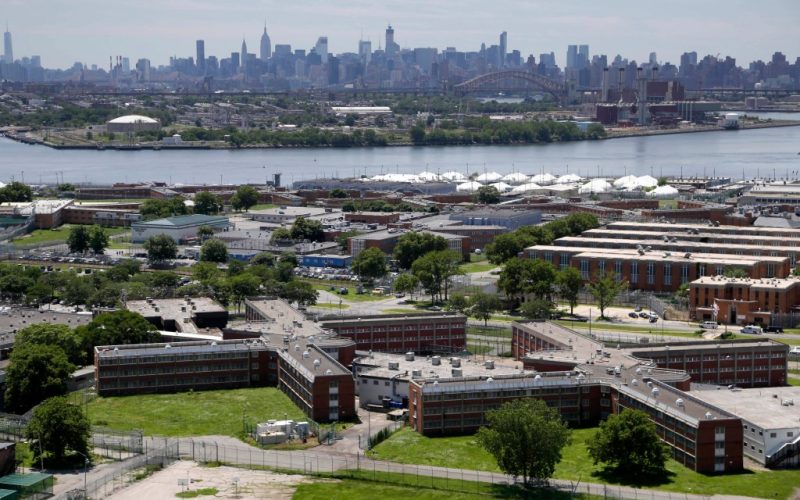An attempt to keep a schizophrenic man out of Rikers Island — where deplorable conditions for the mentally ill have been well documented — ran into a brick wall recently when a Manhattan Criminal Court judge said: “I don’t pick the jails that people go to when crimes are committed.”
Judge Pamela Goldsmith lit into public defender Casey Anis Oct. 9 after Anis implored her to allow his client, accused of thefts in Manhattan and Brooklyn, to remain on supervised release in Brooklyn’s mental health treatment court rather than being subjected to poor conditions and potential isolation on Rikers.
“Let’s get one thing straight. I am not placing your client anywhere, specifically. I didn’t design Rikers. I don’t work in Rikers,” Goldsmith declared Oct. 9, according to transcripts of the proceedings. “I don’t pick the jails that people go to when crimes are committed.”
Anis was able to get Goldsmith’s ruling setting bail overturned by going to another judge in a higher court and keep his client in the mental health diversion program, but the encounter raises the question of what responsibility judges have in assessing the conditions defendants will face when they are locking people up.
Stan German, executive director of the defender group suggested there is a disconnect between the message from the state’s chief judge Rowan Wilson, who has advocated for more use of so-called “diversion” courts, and day-to-day decisions made in court.
In May, Wilson urged the state Legislature to pass pending bills that prioritize treatment courts rather than jail, calling it a “giant step forward.”
“In federal court, judges are refusing to incarcerate individuals at MDC Brooklyn because of the chaotic conditions at the jail. In contrast, too many NYC criminal court judges choose to ignore the atrocities taking place on Rikers Island,” German said.
“At a time when Chief Justice Wilson is embracing the important role of diversion courts in promoting community safety, many judges seem to be undermining this tenet of justice.”
German was referring to a decision in August by federal Judge Gary Brown who said he would release an elderly defendant accused of fraud rather than send him to the federal Metropolitan Detention Center in Brooklyn because of “barbaric conditions.”
In September, the federal facility stopped taking sentenced inmates.
A state courts spokesman declined to comment.
As it relates to the city jails, advocates have been pushing the city to use powers to release defendants who don’t post a threat to public safety.
In the case before Goldsmith, the man was accused of stealing a credit card from a woman’s purse in a church, taking a wallet from a break room at NYU Langone Hospital and stealing checkbooks from a nail salon.
Anis, who works for New York County Defender Services, had moments earlier told Goldsmith that a judge in Brooklyn had already ruled that the man should remain in a treatment program.
He referenced a story published Oct. 8 in the Daily News which detailed the account of a former jail social worker who said seriously mentally ill men were being secretly locked in their cells and deprived of medication for weeks and even months.
“They have been stuck there as if it is solitary, and CHS has not been able to get them their medications for mental health issues,’ Anis said.
“If he is sent to Rikers, there is strong evidence that he would not receive his absolutely necessary mental health medication, and that the court would be placing him in that position despite that strong evidence.”
Anthony DelMundo/New York Daily News
The entrance of Rikers Island Correctional Center in Queens. (Anthony DelMundo/New York Daily News)
But Goldsmith was unmoved by that argument.
“Your client is here because of his own actions. There are two open burglaries, five open cases, and a Brooklyn indictment. Anything else you want to say?” she continued, the transcript shows.
Goldsmith, a former Bronx prosecutor and court attorney, was appointed by Mayor Adams to the bench in April 2023. She previously served as a jurist in Summons Court.
After Goldsmith ordered the man held on bail, Anis went to Supreme Court Justice April Newbauer, who overturned Goldsmith and ordered him released to remain in Brooklyn mental health court.
“I am going to grant the bail application,” Newbauer said, noting the man’s likelihood of appearing in court had already been examined. “It was determined in Brooklyn. I am willing to accept that.”
Back in 2021, Newbauer made news when she ordered the release of a detainee because jails officials had shown “deliberate indifference” in failing to fix appalling conditions and violence in the facilities.
The court exchange comes as the number of mentally ill detainees in the jails continues a three-year rise and the average stay in the jails hovers just under 100 days, city comptroller statistics show.
Darren Mack, co-founder of the advocacy group Freedom Agenda questioned Goldsmith’s claim that judges don’t decide where defendants are placed.
“Judges know where they’re sending the people they remand or set bail on, and they know what’s likely to happen to the people they send to Rikers,” Mack said.
“Thankfully, the second judge to hear this case made the right choice and released him back to the treatment court where he can get the support he needs instead of the abuse and neglect he’d get at Rikers.”








